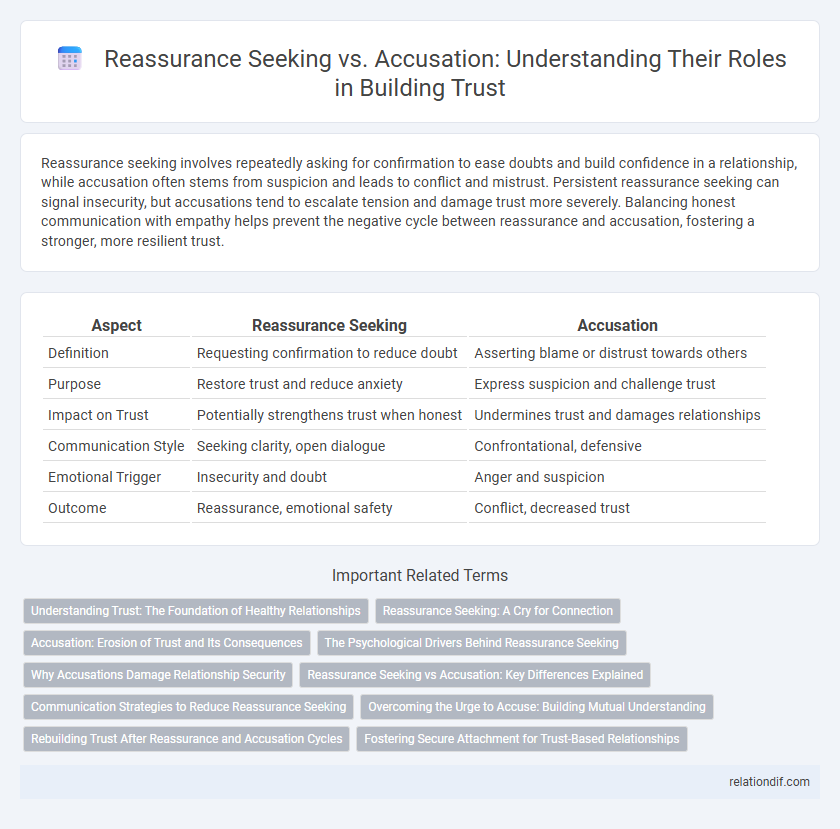Reassurance seeking involves repeatedly asking for confirmation to ease doubts and build confidence in a relationship, while accusation often stems from suspicion and leads to conflict and mistrust. Persistent reassurance seeking can signal insecurity, but accusations tend to escalate tension and damage trust more severely. Balancing honest communication with empathy helps prevent the negative cycle between reassurance and accusation, fostering a stronger, more resilient trust.
Table of Comparison
| Aspect | Reassurance Seeking | Accusation |
|---|---|---|
| Definition | Requesting confirmation to reduce doubt | Asserting blame or distrust towards others |
| Purpose | Restore trust and reduce anxiety | Express suspicion and challenge trust |
| Impact on Trust | Potentially strengthens trust when honest | Undermines trust and damages relationships |
| Communication Style | Seeking clarity, open dialogue | Confrontational, defensive |
| Emotional Trigger | Insecurity and doubt | Anger and suspicion |
| Outcome | Reassurance, emotional safety | Conflict, decreased trust |
Understanding Trust: The Foundation of Healthy Relationships
Reassurance seeking in relationships strengthens trust by fostering open communication and emotional security, allowing partners to feel valued and understood. Conversely, accusation erodes trust, creating defensiveness and emotional distance that undermine the foundation of healthy connections. Understanding trust as a dynamic exchange rooted in empathy and consistent positive interactions is essential for nurturing lasting, supportive relationships.
Reassurance Seeking: A Cry for Connection
Reassurance seeking represents a fundamental human need for emotional connection, often arising from insecurity or fear of abandonment within relationships. It manifests as repeated requests for affirmation and validation to restore a sense of safety and trust between individuals. Understanding reassurance seeking as a cry for connection highlights its role in fostering intimacy, rather than viewing it as mere insecurity or manipulation.
Accusation: Erosion of Trust and Its Consequences
Accusation significantly erodes trust by fostering suspicion, defensiveness, and emotional distance between individuals. This breakdown in trust often leads to communication barriers, diminished collaboration, and increased conflict in relationships or teams. Persistent accusations can result in long-term damage to relational bonds, undermining stability and mutual respect.
The Psychological Drivers Behind Reassurance Seeking
Reassurance seeking is driven by underlying anxiety and fear of abandonment, prompting individuals to repeatedly seek validation of trustworthiness from others. This behavior often stems from low self-esteem and a need for emotional security, contrasting with accusation, which reflects mistrust and defensive aggression. Understanding these psychological drivers is crucial for addressing relationship dynamics and fostering genuine trust-building.
Why Accusations Damage Relationship Security
Accusations undermine relationship security by fostering mistrust and defensive behaviors that erode emotional safety. This dynamic triggers a cycle of blame and conflict, weakening the foundational trust needed for a secure bond. Over time, repeated accusatory interactions diminish open communication, increasing relational insecurity and instability.
Reassurance Seeking vs Accusation: Key Differences Explained
Reassurance seeking involves repeatedly asking for confirmation to alleviate anxiety and build trust, while accusation focuses on blaming or doubting others, which erodes trust. Trust strengthens when reassurance provides clear, empathetic responses, whereas accusations often trigger defensiveness and conflict. Understanding these dynamics helps improve communication and fosters healthier relationships.
Communication Strategies to Reduce Reassurance Seeking
Effective communication strategies to reduce reassurance seeking emphasize clear, consistent messages that build trust and emotional security. Encouraging open dialogue and active listening helps address underlying anxieties without escalating to accusations. Establishing boundaries and fostering self-confidence supports healthier interactions and minimizes repetitive reassurance requests.
Overcoming the Urge to Accuse: Building Mutual Understanding
Overcoming the urge to accuse is essential for building mutual understanding and fostering trust in relationships. Reassurance seeking, when managed healthily, helps address insecurities without escalating conflicts or creating defensive reactions. Techniques such as active listening, empathy, and clear communication reduce misunderstandings and promote emotional safety, strengthening the trust bond.
Rebuilding Trust After Reassurance and Accusation Cycles
Rebuilding trust after cycles of reassurance seeking and accusation requires consistent transparency and empathy to break the pattern of doubt and defensiveness. Establishing clear communication protocols and mutual accountability helps restore emotional security and reduce triggers for suspicion. Fostering patience and validating each other's feelings accelerate the healing process and reinforce a stable foundation of trust.
Fostering Secure Attachment for Trust-Based Relationships
Reassurance seeking often reflects underlying anxiety and can weaken trust when excessive, whereas accusations tend to create defensiveness and erode relational security. Fostering secure attachment involves consistent communication, empathy, and emotional availability to build a foundation of mutual trust. Establishing predictable support and validating each other's feelings promotes a resilient trust-based relationship free from constant doubt or blame.
Reassurance seeking vs Accusation Infographic

 relationdif.com
relationdif.com